- Home
- Deborah Smith
Alice At Heart Page 13
Alice At Heart Read online
Page 13
To help Griffin, I told them.
I turned my attention to the graveyard below me and went down, singing.
Soon, I entered pitch-black water and was cocooned in the indescribable silence of the ocean. I sang out and shivered at the huge shape that came back to me. Slowly, I settled beside it. I pressed my palms to it and froze. I was touching the barnacle-encrusted bow of the Calm Meridian. The nose of the old yacht jutted upright on the ocean floor like a pointed hat some giant hand had set down neatly. I felt my way around it, tracing the outline of a porthole, finding no other openings. The sand fell out from under my feet, and I floated free, startled for a moment, before I regained my footing. I sang out into the Point Trench.
The remnants of the Calm Meridian’s bow perched precariously on the slope of that ancient space, and a small shiver went up my spine. This site was dangerous. Like a tuning fork, my shiver became a song. Shapes bounced back to me. I slid away and explored the safer territory nearby. There lay the other scattered remnants of the classic yacht.
The years and the currents had collapsed the amidships and stern of the wooden vessel into a jumble of timber, all thick with barnacles. I skirted the perimeter of the wreckage, feeling my way around the bottom, scooping my hands into the sand. I began to find small, buried items—a brass cleat, a shard of some heavy, ceramic dishware, a door hinge as might have been on a cabinet in the yacht’s galley. I pulled a small nylon bag from inside the sleek black maillot I wore, carefully tucked my findings into it, then tied the bag around my waist and eagerly returned to digging in the sand. Treasure hunting is exciting, I thought, then caught myself. I sat back on my heels. You’re not hunting Easter eggs. This is a graveyard.
I started again but felt subdued. The lure of a wreck site surprised me. Or was it just my nature to pluck curiosities and fineries from the ocean? Was I indeed the natural inheritor of a mermaid’s talents and a pirate’s tendencies? Nonsense. I busily scolded myself until my hand sank into soft sand and clasped something new. It was heavy and odd-shaped but smooth. I pulled it to the surface and ran my hands over it, sang to it, outlined it in my mind.
It was a marble figurine of a child riding a dolphin’s back.
Oh, Griffin, I thought sadly. Traces of him as a little boy clung to the figurine. He had loved it. His mother had given it to him. He had carried it with him everywhere, even on the last trip he took with his parents. My hands shook. I carefully set the precious piece inside my sack. Singing out to the dolphins to follow me, I headed for Bellemeade Bay and Randolph Cottage.
To Griffin.
15
Land People fight and struggle and yearn to find magic in their lives. Water People hide behind that magic, but realize the loneliness of it.
—Lilith
Traveling on dry land is overrated, Griffin admitted as he managed the last few exhausted paces into the cottage’s sandy yard. Every bone in his body ached, and his scars felt raw. Doctors had removed the casts from his leg and forearm, and he stepped steadily, though with a slight limp. He had just forced himself on his daily fitness hike, a grinding four-mile tour along piney backroads where no one was likely to notice him. A sweaty flannel shirt hung open down his chest, and his old khaki pants had settled low on his hips. The tie-strings on his heavy-soled walking boots had come undone, but his still-healing back was too stiff for him to bend and tie them. He gave in now, in the sanctity of his own yard, and leaned on the mermaid cane as he walked.
“Ready to take on the world,” he intoned, “as long as my pants don’t fall off my ass, or I don’t trip over my own shoelaces.”
You’re doing fine. I left you a gift on the dock. Alice’s voice, dulcet and southern, elegant and somber, sang inside him.
He halted instantly and scanned the bay. There was no sign of her, but she was out there. I’m glad to hear you again, he answered. After that first time—well, I’m not fit company, right now.
I left you a gift. She wouldn’t openly react one way or the other to what had passed between them before, or whether he was fit company anytime. Look on the dock.
He tossed the cane, limped through the heavy sand with as much machismo as he could feign, and made his way down the dock’s alley of heavy, gray plank. His gaze went to the top of the endmost piling. When he saw the small marble sculpture there, he slowed. When he reached the piling, he braced himself on it with one trembling hand. Reaching up with the other, he gently lifted the figurine down.
You found this out there?
Yes, but so could you if you tried.
Slowly, his legs folded, he sat down with the boy and the dolphin cradled in his lap, and bowed his head over it. He stayed there a long time, sifting a torrent of emotions caught in the twilight of such old memories. Alice was silent, and when he could finally clear his head, he knew she’d slipped away to give him his privacy.
She had no idea what she’d done. He looked toward the island and beyond, where the Calm Meridian lay.
If she could find this, he believed her sisters had found him.
They had been out there that day in the storm.
Now he knew how Alice could help him prove it.
Lilith gathered Mara and Pearl long after Alice slept contentedly in bed that night. “Alice confessed something she did today. She was so pleased with herself. And I am pleased for her, honestly. She is growing in confidence every day. She truly wants to do good deeds.”
“Oh, God, what’s our little angel of mercy done now?” Mara asked, as Pearl looked on worriedly.
Lilith told them about the Calm Meridian, the figurine, the visit to Griffin.
Pearl moaned.
Mara grew quietly furious, the combustion ending with a fiery “You knew this would happen!”
“Yes, I did.”
“You know what he’ll think!”
“Yes, I know. I know he’s already making plans. I can feel it.”
“And so we’re going to suffer for Alice’s naïve bumbling in matters she doesn’t understand. Tell her, Lilith. Tell her everything.”
“No. She went out there on her own. She learned something. She took a chance. She learned an invaluable lesson. I will not sugarcoat the truth or take the experience away from her, dear sisters.” Lilith leaned close to them, her eyes and voice adamant. “We will take our chances and keep our silence. And if we have truly been honorable at heart in our lives, then honor will preserve us.”
“Oh, yes,” Pearl said, and sighed. “We must be patient and trust in kindness.”
Mara walked away. “Randolphs only understand revenge,” she said over her shoulder. It was an old argument.
When she, Lilith, and Pearl were growing up, their parents had been fabled hosts. The island’s parties were as beautiful as an art deco window, every element streamlined, sleek, sophisticated. Water People from everywhere filled the great house. The celebrities among them, those known among the ordinary folk on the mainland, had included all sorts of show business stars, artists, sculptors, fashion designers, as well as discreet branches of various royal families, and of course—an afterthought to Mara, though Lilith had found them the most intriguing—scientists, philosophers, and writers. Even a few of the most charming politicians in the world.
During a small afternoon soiree, in which one of the world’s greatest operatic tenors sang from Verdi beside a piano on the lawn, Mother had called Lilith, Mara, and Pearl from their seats in the limbs of the mansion oaks. “Claim your greatness, my darlings,” Helice Bonavendier ordered with a proud smile. “Tell us what fine qualities the music inspires in you.”
“Honor,” Lilith said immediately. “Because without honor, there is only greed and selfish chaos.”
“Here, here,” Father said, applauding. He had, after all, decreed as a young man that the Bonavendier family would no longer prey on passing Randolph ships. Until his generation, elegant piracy had been not only a Bonavendier birthright but also a duty. Water People often said they owned the ocean and all that
passed through it, including ordinary folks’ ships.
“Kindness,” Pearl announced next, curtseying prettily and with such a guileless, merry smile that everyone loved her. “Because someone must look after people’s hearts.” There were smiles and nods and enthusiastic glances between the couples, because Water People were notorious flirts.
“You, my sweet Pearl, are the perfect queen of hearts,” Father praised.
“Revenge,” Mara proclaimed next, standing at attention and eyeing a dashing British admiral as if he would be her military advisor as well as her first conquest. “Because someone has to fight for honor and kindness.” She paused, took a deep breath, then concluded, “Or our kind will surely be left high and dry by our inferiors.”
Father and Lilith scowled at the high-handed sentiment, but Mother smiled indulgently, and the sterling collection of guests mingled applause with arched brows. She was a separatist, and many Water People agreed with her. Father and Lilith, however, did not.
“Let revenge be tempered with honor and kindness,” Lilith countered, “lest Revenge forgets she’s descended from both the water and the land.”
“Here, here,” Father said.
Mara bit her tongue and said no more. But from that time forward she had been Revenge in her heart.
Years later, when Undiline married Porter Randolph and brought misery on the Bonavendiers, Mara contemplated revenge on the arrogant Randolphs and settled on a prime victim: Charles Anthony Randolph—C.A. His senior by a few years, she had already moved to New York to work as a junior designer for Tiffany’s and had easily seduced that British admiral as the first of a long line of men, both her kind and ordinary.
C.A. was Porter’s favorite cousin, like a beloved younger brother, just twenty years old. Tall, handsome, black-haired, dark-eyed, and rich, he was a typical young Randolph, studying business at a fine southern college, already being groomed for a future in Randolph Shipping. But C.A. was more than a pampered son of pampered sons; he was smart, thoughtful, protective of his younger cousins, respectful to his father—a chief executive for Randolph Shipping—and awed by his mother, a tough, old-south socialite who masterminded the restoration of the magnificent homes in Savannah’s historic district, many of them owned by Randolphs or Randolph kin.
He was irresistible to the daughters of Savannah’s old-blood families and never tried hard to be otherwise. Yet, during that summer of the early 1960s, during a solstice dance at one of the old Savannah rice plantations, he wandered away from the buffet, the dance floor, the band, and at least a dozen young women who badly wanted to be the next keeper of a Randolph silver pattern. A little drunk on bourbon and Coca-Cola, he frowned in aroused confusion as a low, provocative purr grew inside his head, calling him. The lure led him out on a shadowed walkway that curled through tidal marshes singing with night insects and the hot, damp, ocean breeze. Under a half moon he found his way, the erotic hum winding down his spine and through his belly, his dance-sweated khakis bulging at the groin. He found himself almost running along the weathered boardwalk, where long shadows fell between flickering kerosene lanterns. He had no idea what was happening to him, only that he couldn’t stop.
There, at the end of the boardwalk, where it became a small, low pier brushed by the marsh grass beneath—there, in deep shadows—stood Mara Bonavendier, naked, a river of mahogany hair drying in thick waves around her breasts and down her body to her knees. He’d met her parents at parties along the coast, and he knew all of his family’s stories about the strange, dangerous Bonavendiers. Porter had caused an uproar by marrying a woman from their circles. Not a Savannah girl. A wild Scottish woman, with an odd first name—Undiline. C.A. had come to know and adore Porter’s green-eyed, stunning wife, and had even pledged to be one of several young godfathers to hers and Porter’s son, Griffin. But he’d never met one of the Bonavendier daughters. Yet he knew instantly who this one was; somehow, she told him.
I’m Mara, the bad one, she whispered in his brain, his sex, his soul.
C.A. stumbled onto the small pier, halted, and stood looking down at her helplessly. “My God,” he whispered.
She pulled her long, dark hair back from her pale, perfect body, and his knees went weak from wanting her. Her eyes glowed. “You Randolphs cause us so much grief,” she said. “Come here and show me why Undiline believes your kind is worth the trouble.”
He lurched at her, took her face between his hands, and kissed her as gently as a troubadour vowing his soul. “I love you,” he said.
For one instant, her incredible, sea-cold eyes softened with uncertainty. She had not expected him and his boyish impulses to be easy to adore. “Don’t you dare be so foolish,” she whispered. “I’m going to break your heart and teach Randolphs to stay away from us.”
He laughed. Then he kissed her again, and if she had considered any mercy, that kiss made her recant it. He gasped as she took him off the end of the pier, into the shallows. The water of the marsh surrounded them with its erotic rhythms.
And there she began the slow, thorough process of breaking his heart, and her own.
16
A mermaid found a swimming lad, picked him for her own,
Pressed her body to his body, laughed; and plunging down
Forgot in cruel happiness
That even lovers drown.
—W.B. Yeats
I’ve earned new wrath from Mara somehow. She is avoiding me with bristly, dark-haired elegance, the hint of a quick cat-slap always present in her attitude. I avoid her in return, though I have had the courage to peer into her sunlit workshop off a back hall in one of the mansion’s side wings. She designs the sisters’ jewelry and is quite talented at it. Her pieces are also sold in a small shop the sisters own in Bellemeade. They own at least half the shops in the pretty little town, including the inn, WaterLilies. The Tanglewoods, among other duties, manage those enterprises.
“Mara’s patrons order her designs from all over the world,” Pearl said today. “She’s quite well connected and very well liked. You know, this family is quite lovable and honorable and . . . and kindly. We’ve never hurt anyone. Not deliberately.”
Pearl seems strangely intent on explaining life among the Bonavendiers to me. She and each of her sisters have duties, a vocation, a role to play. Pearl acts as social secretary, and judging by the mounds of correspondence in her exuberant, colorful office (jeweled porcelain butterflies dangle from the ceiling on gold wires, need I say more?), the sisters entertain a vast array of guests and old friends. I suspect they’ve put their social calendar on hold while I adjust. Or am adjusted.
Lilith is the writer and publisher. She compiles histories of the southern coast, botanical treatises, and stories of the oceans provided by god knows who among her far-flung associates. In an office as feminine as a boudoir straight from some Parisian villa, she has shown me little thank-you notes from her past or current collaborators.
“Jacques Cousteau,” I said on a short breath.
“Hmmm,” she acknowledged, as if the world-famous scientist was just her assistant. I began to realize that some of my favorite books include Lilith’s work, under pseudonyms.
“I have been reading her words, absorbing her spirit for years,” I said to Pearl.
Pearl stared at me. “Well, then, you’re ready to listen to the good stuff.” She pulled me to the beach.
Before I knew it, we were running like children, the wind tangling her long hair and ruffling my shorter locks. We raced along the island’s curving length until we came to a small gazebo mired in the dunes. We flung ourselves, drunk with the ocean scent, into two of the gazebo’s wind-weathered rocking chairs.
The bright sun poured under the gazebo’s eaves and cast us in golden shadows. Pearl wore a blue swimsuit with a diaphanous, flowered scarf tied around her waist. She threw her red hair—easily two yards long—over the back of the rocking chair and dug her webbed toes into mounds of sand the wind had pushed onto the gazebo’s slatted wooden floo
r. The pale cream of her skin glowed in the soft light.
Envy and deep yearnings rose inside me. I smoothed my hands over the flowing top and pants I wore, made of fine, antique-white silks that moved with me like the wind. I ruffled my growing hair and furtively tried to make the auburn lengths protrude just a little over my chair’s back. I tentatively slid my bare feet across the floor and let the soft sand caress the tender webbing. Oh, Lilith, do our fantasies have to be built on the deepest pools of sorrow?
Pearl must have caught the wisp of my thought. She wrung her hands and watched me worriedly. “Do you know what, Alice? What every one of us merfolk understands? That sorrows sink us but love keeps us afloat. Love is our breath beneath the waters.” Having delivered that philosophy, she nodded firmly. “Ask me your questions, Alice.”
I bowed my head. Let me believe in love. “You’ve been married to Barret a long time?”
“He’s not my husband.”
“Forgive me, I assumed—”
“We try not to draw attention to his circumstances. He’s not a citizen, you see.”
“When did you meet?”
“Oh, we’ve been together for nearly sixty years. I was five when we met. He was no more than sixteen. Of course, he was very brotherly until I grew up and we became lovers.”
I did some quick calculations and realized her numbers put their first encounter squarely in the early 1940s, during World War Two. “Did he escape the war in Europe by coming to America?” I thought perhaps he was a Jewish immigrant of German origin.

 Legends
Legends Hold on Tight
Hold on Tight Just a Little Bit Guilty
Just a Little Bit Guilty The Beloved Woman
The Beloved Woman Alice At Heart
Alice At Heart Heart of the Dragon
Heart of the Dragon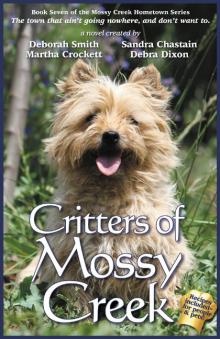 Critters of Mossy Creek
Critters of Mossy Creek Diary of a Radical Mermaid
Diary of a Radical Mermaid Caught by Surprise
Caught by Surprise Stranger in Camelot
Stranger in Camelot At Home in Mossy Creek
At Home in Mossy Creek Charming Grace
Charming Grace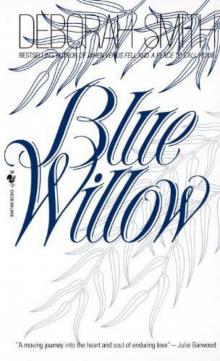 Blue Willow
Blue Willow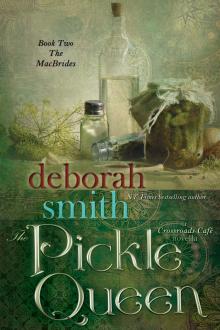 The Pickle Queen: A Crossroads Café Novella
The Pickle Queen: A Crossroads Café Novella On Bear Mountain
On Bear Mountain The Biscuit Witch
The Biscuit Witch Sara's Surprise
Sara's Surprise More Sweet Tea
More Sweet Tea The Apple Pie Knights
The Apple Pie Knights The Silver Fox and the Red-Hot Dove
The Silver Fox and the Red-Hot Dove Sweet Hush
Sweet Hush California Royale
California Royale Hot Touch
Hot Touch Miracle
Miracle The Stone Flower Garden
The Stone Flower Garden A Place to Call Home
A Place to Call Home Silk and Stone
Silk and Stone Honey and Smoke
Honey and Smoke Jed's Sweet Revenge
Jed's Sweet Revenge Silver Fox and Red Hot Dove
Silver Fox and Red Hot Dove The Kitchen Charmer
The Kitchen Charmer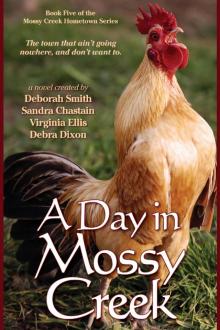 A Day in Mossy Creek
A Day in Mossy Creek Never Let Go
Never Let Go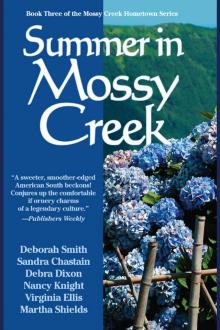 Summer in Mossy Creek
Summer in Mossy Creek On Grandma's Porch
On Grandma's Porch The Crossroads Cafe
The Crossroads Cafe Follow the Sun
Follow the Sun The Yarn Spinner
The Yarn Spinner A Gentle Rain
A Gentle Rain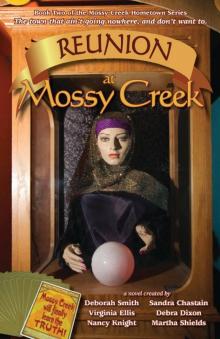 Reunion at Mossy Creek
Reunion at Mossy Creek